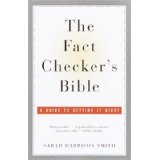 Check your facts.
Check your facts.
You might not be Brian Williams. Maybe you don’t plan to write a memoir about your experience in the war against terrorism, cancer, death, or addiction. If you are a professional writer, you need to know facts still matter.
Especially to your readers.
If you write nonfiction, your credibility as an author depends on it. Corroborate your facts with additional documentation. Immerse yourself in the evidence.
 The author is responsible for any factual errors and you don’t want to be embarrassed or discredited. This is not the kind of controversy which sells books. Forces publishers to pull them from the shelves and eat crow.
The author is responsible for any factual errors and you don’t want to be embarrassed or discredited. This is not the kind of controversy which sells books. Forces publishers to pull them from the shelves and eat crow.
So what are the most common tools I recommend to nonfiction writers for fact checking?
Lmgtfy.com Let Me Google That For You. It’s true. There is no magic key. It’s all in your keywords. What’s your question?
What did they use the iron lung for in treating tuberculosis? What’s the word to describe the science of vineyards and grapes? My mom said she wore saddle shoes but would they have made them and sold them in 1942 in Minnesota? What was the weather like the day I was born? Whenever you are writing about in first-person you face the dangers of relying on memory alone.
 Start with a list of words and phrases specific to your project. Choose 10-12 terms and update the list once a month. These keywords are specific to the subject of your work. Names, Places, Events, Topics. With a strong list of keywords, you might find these writer’s research tools will help you identify relevant sources for your project.
Start with a list of words and phrases specific to your project. Choose 10-12 terms and update the list once a month. These keywords are specific to the subject of your work. Names, Places, Events, Topics. With a strong list of keywords, you might find these writer’s research tools will help you identify relevant sources for your project.
- Google Alerts. You sign up to be notified by email when any new material is posted on the internet using the key terms you select.
- Google hosts LIFE photo archive – This photo archive allows you to “see” what things looked like according to Life Magazine by year. There are many other historical photography archives online.
- Google Maps. This service allows you to get access to maps of various sites around the world. Getting a street view or bird’s eye perspective can help you get it right in your writing.
- Google Scholar. This advanced search engine gives you access to scholarly literature. Every researcher should use it.
- Google Translator Toolkit. This instantly translates foreign languages found in your searches into English.
- Online Conversion is a resource to convert just about anything; weights, measures, metric, temperatures.
- National Archives and Records Administration. www.archives.gov
- Researching historical figures (actual people who lived and died): Biography.com and FamousPeople.com
- Researching historical context (the milieu of a specific time and place): Timelines.WS and HistoryMole
 Finding information is one thing. Getting it right in your writing means you check for accuracy, test validity, determine reliability, and assess the credibility of your sources. The Fact Checker’s Bible: A Guide to Getting It Right by Sarah Harrison Smith can guide your skill set.
Finding information is one thing. Getting it right in your writing means you check for accuracy, test validity, determine reliability, and assess the credibility of your sources. The Fact Checker’s Bible: A Guide to Getting It Right by Sarah Harrison Smith can guide your skill set.- Poets & Writers. Tools for Writing Page; general resource for writers including writing prompts/exercises, list of awards, MFA programs and jobs for writers, and more.
There are other sites for more advanced search strategies.
What tools do you use for fact-checking?

This is a very good list; thanks for posting. I am going to check out Lmgtfy.com.
To your list I would add archives and archivists for historical research. Archivists can help you tap into an incredible amount of information you never knew was there.
I remember the day you told me I needed to base my memoir on facts. And after days of panic I discovered there was much to be found in my personal journal/date book, my daughter’s blog site, my sister’s online family newsletter, correspondences with doctors and social workers, and emails. For writing memoir, even small things like these can yield a lot of important information. Cheers!